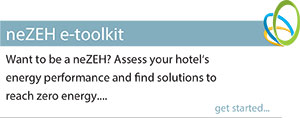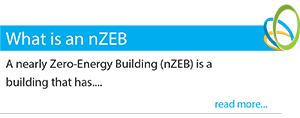Use the neZEH e-toolkit. Assess how close you are to becoming a neZEH
The neZEH e-toolkit, developed under the frame of the nearly Zero Energy Hotels (neZEH) initiative, is a practical tool for hotel owners to help them benchmark their energy consumption comparing to the neZEH levels and to suggest appropriate measures for energy efficiency improvement and renewable energy integration in order to turn their hotels into nearly Zero Energy Hotels.
The neZEH e-toolkit is based on the UNWTO Hotel Energy Solutions toolkit (also co-funded by the Intelligent Energy Programme), which -since 2011- has engaged 20,000 users worldwide and 1,500 hotels in Europe in better understanding how to become energy efficient and more competitive. It is designed to increase the energy efficiency capacity in the accommodation industry and to encourage hotel owners to proceed to energy renovation projects towards zero energy targets.
The easy-to-use e-toolkit requires answers to a short questionnaire and consequently provides hoteliers with a report assessing their current energy profile, indicating how close the hotel is to from achieving the nearly zero energy levels and providing an indicative set of appropriate renewable energy and energy efficiency measures.
“As tourism is a force for good, we need to ensure the promotion and development of sustainable, resilient and responsible tourism, which requires vision, innovation, correct planning, good management, sound monitoring and the involvement of all the relevant stakeholders, including consumers” said Mr. Márcio Favilla, UNWTO’s Executive Director for Operational Programmes and Institutional Relations at the launch event of the toolkit. neZEH is developed within the principles of the 10-Year Framework of Programmes on Sustainable Consumption and Production Patterns and particularly of the 10YFP Programme on Sustainable Tourism (10YFP STP). 10YFP STP is led by UNWTO with the support of the United Nations Environment Programme (UNEP). The initiative will provide technical expertise to the private sector while fostering tourism public policies in the areas of energy efficiency and help the tourism sector in its contribution to the newly adopted Sustainable Development Goals (SDGs).
Get started!









